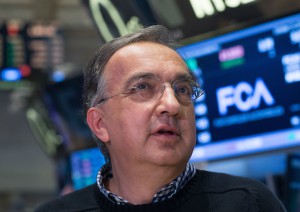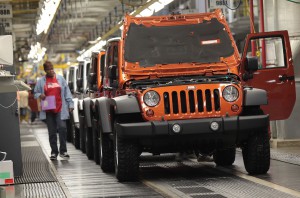
Sergio Marchionne's continuing search for a partner for Fiat Chrysler has attracted interest from potential buyers and investors.
(CORRECTION: This story has been updated to reflect an error regarding the financial status of Chinese automaker Great Wall Motors. The country’s largest producer of SUVs and light trucks has not undergone a reorganization or a Chapter 11-style filing, as we originally reported. We apologize for that error.)
Even when he fails to consummate a transaction, as he did two years ago, Fiat Chrysler chief Sergio Marchionne still enjoys a reputation as an astute deal maker.
So it’s not exactly a surprise that shares of Fiat Chrysler Automobiles N.V. climbed to a record high following reports that FCA was dickering with Chinese companies about a possible deal. Fiat Chrysler’s U.S.-listed shares surged 8.5% to $12.60, the highest close since trading began in October 2014. The stock has risen 38% this year.
In an e-mail, FCA declined to comment on the rampant speculation of a potential alliance or sale of the company.
Adam Jonas, Morgan Stanley analyst, noted there is “substantial hidden value” in several of the company’s brands that could emerge from spinoffs or sales to other automakers. Earlier this year, Marchionne mused that FCA, which is still heavily in debt, could raise money by spinning off Jeep like it did Ferrari.
The key to the Ferrari deal, however, was that although the brand became independent on paper, control remained vested with Fiat Chrysler and its ruling Agnelli family.
(Bid rejected, but will another Chinese offer be coming for FCA? To find out, Click Here.)

FCA plant employees on Facebook are suggesting they'd prefer a Chinese company buy FCA than a merger with another U.S. automaker.
Any Chinese company, which would probably require support from the Chinese authorities to close a deal, would insist on what the Germans call the “Golden Share.” The leading candidates for FCA appear to be Guangzhou Automotive and Great Wall Motors, the latter considered China’s largest producer of SUVs and light trucks.
A sale to a Chinese company, though, might well serve as a lifeline for FCA, which is facing steep challenges in an era when the industry is facing a technological revolution for which the automaker seems ill-prepared compared to its rivals.
Al Koch, vice chairman at the global business advisory firm Alix Partners, noted in a recent speech that automakers are seeing their capital-spending levels average nearly half their of available cash per year.
Now they are about to be hit with an incremental increase in spending for the technological revolution sweeping (i.e. safety technologies, autonomous vehicles, etc.) the automotive industry today. This could potentially strain the auto industry’s cash reserves in ways not seen since the Great Recession, and should prompt companies throughout the industry to focus on return on invested capital, Koch said.
Koch’s recent remarks at an automotive conference in Traverse City, Michigan, about the industry’s penchant for gobbling up capital also reflected the analysis Marchionne used to justify his seeming Quixotic pursuit of General Motors two years ago.
(Click Here to see more about the possibility of FCA selling of Jeep and Ram.)
In addition, Facebook posts from FCA employees have suggested that a deal with the Chinese that would basically leave the Detroit-based FCA Group intact was preferable to a merger with GM, Ford or some other automaker that could lead to plant closings.
The Chrysler Group’s near-death experience under ownership by investment group Cerberus also means that the UAW would certainly mount an effort to block a sale to a hedge fund or any other type of investment group.
As investors, the Chinese are well known around Detroit. SAIC, one of China’s largest automakers, has offices in suburban Detroit and the state-owned enterprise operates Nexteer, a key supplier to General Motors. Chinese investors also control Detroit-based Key Safety Systems, which recently acquired Takata’s airbag business out of bankruptcy.
However, the political fallout in the United States and Italy is potentially explosive.
Italy has never quite recovered from the Great Recession and jobs are a critical issue. Meanwhile, the reaction of the Trump administration, which also has talked about concern for blue-collar jobs in the U.S., is unpredictable at this point. Also uncertain is the attitude of the Agnelli family, which now has the controlling interest.
Fiat was founded in 1899, making it one of the world’s oldest car companies and it has now survived two World Wars, the rise of Fascism, the Great Depression of the 1930s and the Red Brigades. It has also managed to reach an accommodation with Italy’s tempestuous political culture.
Under Marchionne’s tutelage, John Elkann, the still youthful head of the Agnelli family business empire, has grown into his role as a senior executive. But Elkann and the rest of the family, which up until now seems to have followed his leadership, have allowed Marchionne to wheel and deal for the past decade.
(For more about FCA’s efforts to secure a partner, Click Here.)
Moreover, a deal could be structured so that the Agnelli clan retains a portion of the automotive assets such as Ferrari, Alfa Romeo, Maserati and even Lancia. But what happens to the Fiat brand with its family ties, links to Italian culture and Agnelli family heritage and pride, could well be the key to any kind of deal where Ram and Jeep have become the prize.
